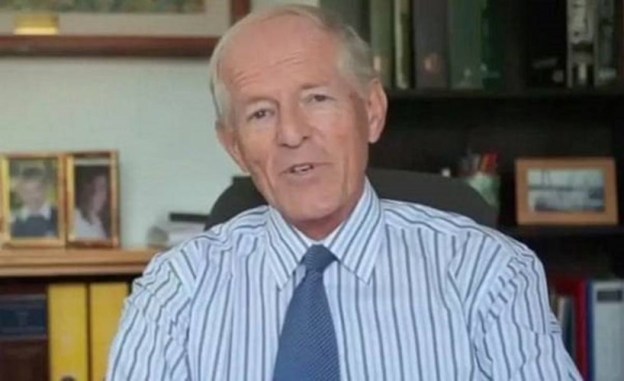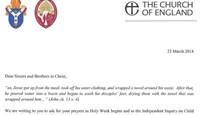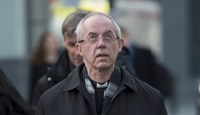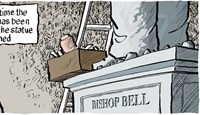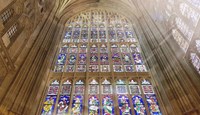Archbishop Welby announces further investigations into John Smyth case
by MADELEINE DAVIES 20 MAY 2021
 CHANNEL 4 NEWS
CHANNEL 4 NEWS
John Smyth
EVERYONE who knew about the abuse perpetrated by the late John Smyth and failed to report it will be investigated by the National Safeguarding Team, the Archbishop of Canterbury has said.
In a statement issued on Thursday, Archbishop Welby offered a “full, personal apology” to victims of Smyth, whose abuse, he says, was “done in the name of Jesus Christ by a perverted version of spirituality and evangelicalism”.
It is now more than four years since Channel 4 News broke news of the violent abuse perpetrated by Smyth, a QC and former chairman of the Iwerne Trust (later part of the Titus Trust), which ran holiday camps for boys at English public schools in the 1970s (News, 10 February 2017).
Both the Iwerne Trust and Winchester College, where many of Smyth’s victims were pupils, learned of allegations of the abuse in the 1980s, but failed to report them to the police. One survivor grew so fearful of the beatings that he tried to take his own life in 1981. It prompted the Iwerne Trust to launch an investigation and compile a confidential report in 1982. Written by Canon Mark Ruston, the Vicar of the Round Church, Cambridge, from 1973 to 1987, and the Revd David Fletcher, a Scripture Union employee, it described the abuse of 22 young men: “The scale and severity of the practice was horrific. . . eight received about 14,000 strokes: two of them having some 8000 strokes over three years.”
The abuse was not limited to the UK, where it has been estimated that there are more than 100 survivors (News, 31 May 2019). After the Ruston report, Smyth went to live in Zimbabwe, where he continued to run holiday camps — Zambezi Ministries — and South Africa. In Zimbabwe, “almost constant concerns” were raised about Smyth, as early as 1986 (News, 10 February 2017). In 1992, a 16-year-old boy, Guide Nyachuru, was found dead in a swimming pool at a Zambezi camp, prompting other young men to come forward. A paper heard by the Supreme Court of Zimbabwe in 1997 suggests that 90 boys had raised allegations against Smyth (News, 31 May 2019).Advertisement
Smyth died in 2018, before he could be questioned by police, arrested, or tried (News, 17 August 2018). That year, Hampshire Police confirmed that no charges would be brought against anyone else.
It is now four years since the Channel 4 investigation and almost two years since a former director of social services, Keith Makin, was appointed by the NST to carry out a “lessons-learnt” review of the handling of allegations of abuse (News, 1 March 2019; 16 August 2019). In his statement this week, the Archbishop acknowledges that survivors of abuse have endured “a long wait” and says that he is “absolutely determined that the Makin Review will be as comprehensive and strong as it can be. I have given an undertaking that it will be published in full. I pray that this can give some sense of closure for these victims.”
The statement follows a meeting with some of the survivors of Smyth’s abuse. The Archbishop confirms that he has apologised that it has taken so long to arrange the meeting, acknowledging that this has caused “much frustration and anger”. In 2019, a spokeswoman for Lambeth Palace said that he hoped to meet survivors “as soon as possible” (News, 18 April 2019)
“In February 2017, I issued a general apology on behalf of the Church of England, as the story was breaking, and before we understood the full horror and scope of the abuse,” the statement says. “Having met some victims now, I want to offer a full, personal apology. I am sorry that this was done in the name of Jesus Christ by a perverted version of spirituality and evangelicalism.
”It is clear that the impact of this has been widespread. I want to offer this apology, in addition, to those Smyth victims that I have not met. I continue to hear new details of the abuse and my sorrow, shock and horror grows.”
The statement says that the Church “has a duty to look after those who have been harmed. We have not always done that well.” Graham* (a survivor, not his real name) has consistently challenged the Church’s handling of the allegations, including “appalling” communication with survivors (News, 1 March 2019).
In a 2019 Channel 4 interview, Archbishop Welby said that Smyth was “not actually an Anglican” and that the C of E was “never directly involved” — an account immediately disputed by survivors (News, 18 April 2019). Graham’s assertion that Smyth was a Reader in the C of E has since been confirmed.
Last year, the NST concluded that Graham’s complaint against the Archbishop about his handling of allegations about Smyth was “not substantiated” (News, 13 November 2020).
In this week’s statement, the Archbishop seeks to clarify what he knew, and when, about the abuse. Victims are angry, he says, that Smyth was not stopped in 2013, when a disclosure was first made to the diocese of Ely, and the Archbishop was informed (News, 10 May 2019).
“By this time Mr Smyth had been out of the UK for nearly thirty years,” he says. “We, the Church, were unclear as to his activities abroad or indeed to the utterly horrendous scope and extent of his actions here and overseas. I recognise the anger of the survivors and victims but having checked that the Diocese of Cape Town was informed and that the police were properly informed and involved our jurisdiction did not extend further. I believe that by 2013 Mr Smyth was no longer attending an Anglican Church.”
He continues: “These victims are rightly concerned that no one appears to have faced any sanction yet, when it is clear a number of Christians, clergy and lay, were made aware of the abuse in the 1980s and many learned in subsequent years. I have not yet received a list of names. I am told by survivors that some facilitated Smyth’s move to Africa. I have made it clear that the National Safeguarding Team will investigate every clergy person or others within their scope of whom they have been informed who knew and failed to disclose the abuse.”
The Archbishop has also confirmed that he will write to the family of Guide Nyachuru. “I apologise on behalf of the Church of England to all those in Africa who were abused after John Smyth had been uncovered in the UK in 1982, although the Church did not know, owing to the cover up, of the abuse until 2013,” the statement says.
A statement from a group of victims of Smyth’s abuse, issued on Thursday, said: “We are pleased that the Archbishop of Canterbury is taking responsibility and acting as a good example for the other culpable parties involved in our story.” It called on Scripture Union, the Titus Trust, and Winchester College to follow the Archbishop’s lead and “reveal everything they know about the abuses and their coverup. It is clear a large number of individuals, clergy and lay, have known about these abuses for over thirty years and we call on them to cooperate fully with the Makin Review and the National Safeguarding Team. For victims like us, full closure is impossible without full disclosure.”
Martin Sewell, a lay member of General Synod who has read the Ruston report, has suggested that “well over 100 people knew, heard, or suspected that something was seriously amiss in varying degrees” (News, 1 March 2019). Evangelical clergy and organisations have denied knowledge of the abuse (News, 3 March 2017). Canon Ruston died in 1990. Archbishop Welby was a dormitory officer at Iwerne holiday camp in the late 1970s, when Mr Smyth was one of the leaders. He has always maintained that nobody discussed the allegations with him and that he first learned of them in 2013.
The NST has concluded that a former Archbishop of Canterbury, Lord Carey, saw a report about the abuse while he was Principal of Trinity College in the 1980s — a conclusion which he disputes (News, 29 January 2021).
Smyth was a trustee of the Scripture Union from 1971 to 1979. An independent case review (of which only the executive summary has been made public) quotes a former SU national director, the Revd Tim Hastie-Smith, who admits that he was either “grotesquely insensitive” or “extraordinarily incurious” about reports of the abuse (News, 1 April 2021). In October 2014, he wrote: “Apparently, the incident is ‘well known’ and involves a number of high-profile individuals. . . It is hard to see how this incident has remained ‘secret’ for so long.” The review notes that the individuals who received full disclosure of Smyth’s abuse “have all been described by victims as having ‘huge social polish’ which made them very convincing, dominant and persuasive”.
The Titus Trust has said that it will co-operate fully with the Makin review. It has commissioned Thirtyone:eight to undertake an independent review of the current culture of the Titus Trust, due to be published this summer. An earlier review has not been made public. The Iwerne summer camps were closed last year (News, 29 May 2020).
The Makin report was due to report in August last year, but was delayed owing to the coronavirus pandemic (News, 1 May 2020).
Archbishop Welby’s statement concludes: “I know that words are inadequate and will have a different meaning and impact on individuals, but I hope that my words today can convey on behalf of the Church of England and myself our deepest sorrow.”
SURVIVING CHURCH

